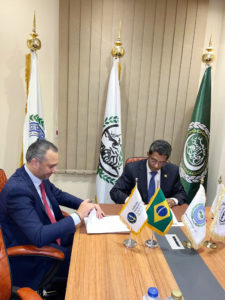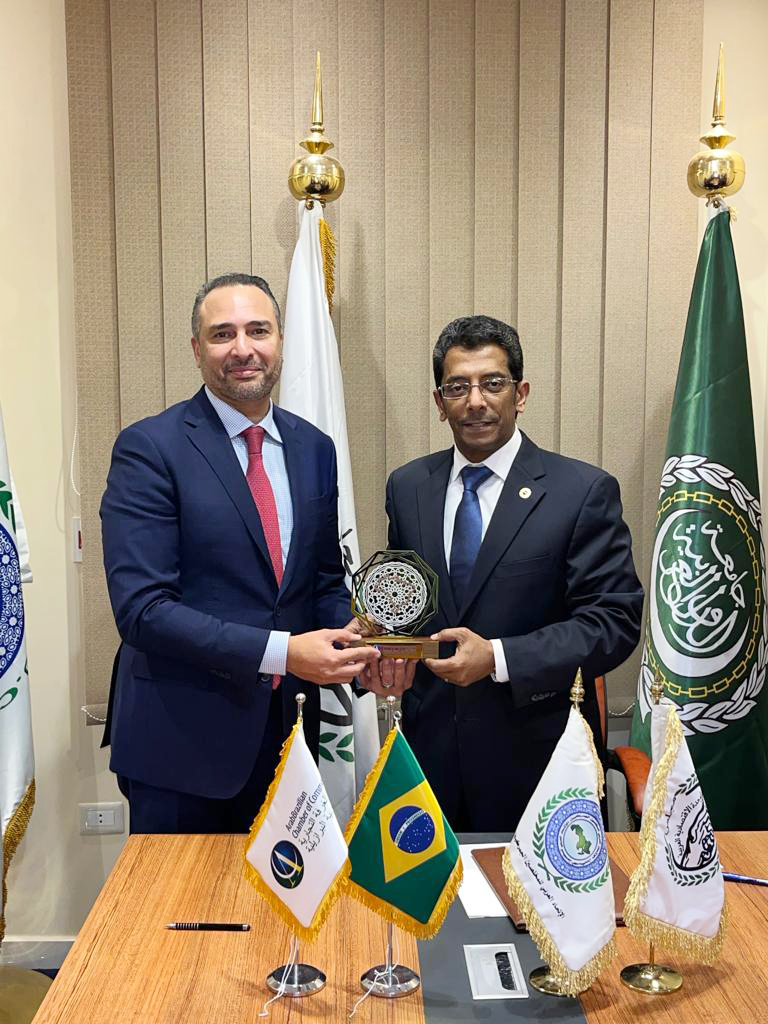Cairo – The Arab Brazilian Chamber of Commerce (ABCC) signed a cooperation protocol with the Arab Union of Customs Executives (AUCE) to collaborate in areas of common interest and exchange experiences with Arab countries. The ABCC has a branch office in Cairo, where the protocol was signed.
Tamer Mansour, secretary-general & CEO of the ABCC, met with Mamdouh Al-Rifai, president of the AUCE, and said there are many opportunities for cooperation and integration between the two institutions, especially as they have a considerable number of members and a strong network of relationships in the Arab countries and Brazil. Pictured above, Mansour and Al-Rifai.
Mansour highlighted the ABCC’s mission to foster cooperation between the parties and advance towards strengthening ties and boosting investments. The executive also said the ABCC seeks to amplify and expand partnerships to create opportunities and consolidate ties between Brazilians and Arabs, facilitating the flow of information.
Mansour said the ABCC signed a cooperation protocol with Jordanian customs to implement the digital customs clearance system. Jordan was the first Arab country to employ the system launched by the ABCC, which intends to extend it to all Arab countries to facilitate intra-regional trade.
He added that, in the coming days, a workshop would be held in Jordan to train local customs operators to use the digital system, which allows streamlined import and export processes.
He pointed out that, through cooperation between the ABCC and AUCE, other workshops and seminars could be held in all Arab countries to disseminate the system for digitizing customs clearance.
COP27 in Egypt

At a meeting with Al-Rifai, Mansour also said the ABCC would hold a series of meetings and seminars in parallel to the United Nations Conference on Climate Change (UNFCCC COP 27), to take place in Egypt in November, and the logistics sector would be addressed in most of these events. Mansour invited the AUCE president to participate and present the entity’s proposals to boost the logistics sector in the Arab world.
Mamdouh Al-Rifai welcomed the cooperation with the ABCC at all levels and highlighted the commitment the AUCE would employ to achieve the goals. He pointed out the AUCE and the ABCC have great potential in common, which must be explored to meet the interests of the Arab countries and Brazil.
Al-Rifai stressed the AUCE is always ready to cooperate with all relevant parties and authorities to expand the trade and customs sectors. He also said one of the most important goals of the AUCE is to build cooperation bridges with Arab and international organizations to guarantee the flow of intra-Arab and international trade.
The protocol provides for cooperation between the AUCE and the ABCC in future joint meetings to organize conferences, seminars, training programs, and workshops aimed at Arab and Brazilian economic agents. These events would foster ties and raise awareness among traders, importers, exporters, and customs brokers in the Arab world and Brazil.
The protocol includes cooperation for disseminating knowledge on economics and customs among Arab countries and finding cooperation opportunities for its members. It also seeks to optimize existing regulations and propose better mechanisms to keep up with the pace of global transformations, helping to improve performance in export markets and linking relevant economic operators in the Arab countries and Brazil.
Translated by Georgette Merkhan & Elúsio Brasileiro




